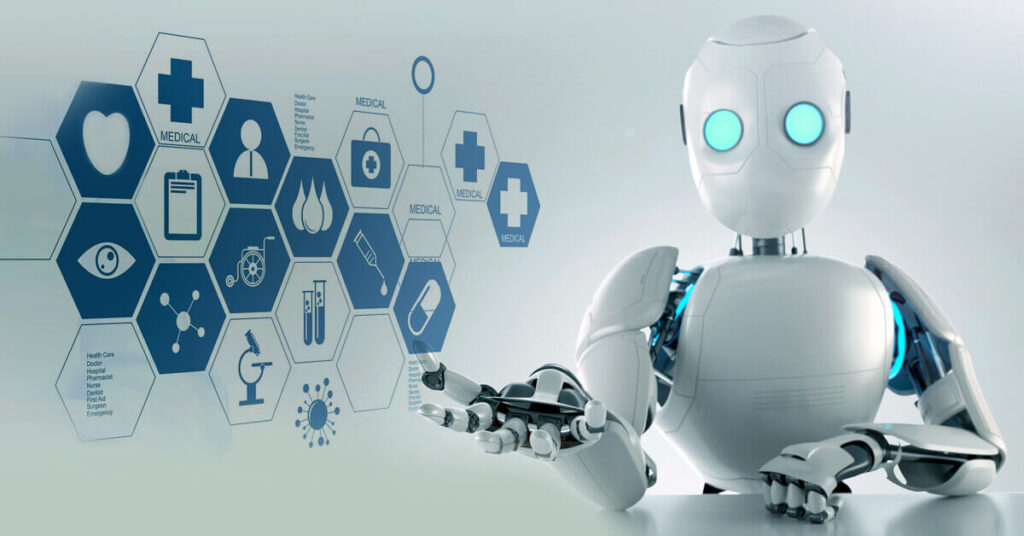
The idea of robotics in healthcare is not new to the world. However, only a minuscule of its potential has been realised yet. Now with artificial intelligence (AI) getting increasingly sophisticated at doing what humans do, we are seeing revolutionary transformations in the healthcare services. Apart from opening the new avenues in healthcare and diagnosis, robotics and AI have made the healthcare services more efficient, personalised, affordable and accessible.
Let’s see how artificial intelligence and robotics have impacted the healthcare sector:
By leveraging artificial intelligence and robotics, healthcare systems have managed to significantly reduce the cases of misdiagnosis and other medical errors. Also, since robotic systems don’t have feelings, they don’t get tired and have unflinching attention their error percentage is significantly lower than human medical practitioners. Incorporation of robotics and AI in healthcare has reduced clinical deaths considerably.
Since the artificial intelligence backed medical robots are trained exhaustively, they perform tasks with excellent precision, increased strength and supreme execution.
Also, advancements in AI have improved targeted micro-robots, which perform specific functions like deploying of drugs locally or performing micro-surgeries like unclogging of blood vessels, removal of tumour etc.
Precision in diagnosis
Artificial Intelligence helps in detecting patterns, this makes identifying various conditions by studying medical records and reports of patients easier. Advanced systems can swiftly scan through thousands of cases and can establish insightful correlations between different medical parameters.
Another advancement that AI has brought in diagnosis and treatment is that it enables physicians to follow a comprehensive approach for treatment or disease management. It also helps patients to better understand their condition and comply with their personalised treatment programmes.
Daily Care
Today hospitals are also using robots for providing daily care to patients. These robots can perform several human functions like cheering patients and elders to make them feel less lonely, conversational robots can also engage in conversations with the patients. Robots can also play games, dance and sing songs for people under rehabilitation and recuperation.
Robots also specialise in providing personal care to the patients by reminding them to take their medicine, eat food. They also perform routine medical tasks and check-ups like temperature, sugar level, blood pressure etc.
Auxiliary robotic systems
Robotic systems not only help doctors and surgeons conduct delicate surgeries, but they also lend a helping hand to nurses and other support staff in hospitals.
Restocking of medicines, maintenance of equipment, updating of patient’s records, cleaning activities are some of the ancillary activities which robots perform efficiently. Apart from the staff, robots also help patients for eg: exoskeleton robots help paralyzed patients walk again.
Smart prosthesis is another application of artificial intelligence that has brought new opportunities to handicapped people. These bionic limbs have sensors and their reaction, accuracy is the same if not better as natural body parts.
Improved Decision Making
Timely decision making is a key component of a good healthcare system. And accurate decisions are possible if they are taken on the basis of data, more the data better the decision making. But with the availability of data comes the problem of digging relevant insights from this data. Predictive analytics performed by AI-based solutions support clinical decision-making and also subsequent actions.
Another area where AI is contributing significantly is the identification of people who are at risk of developing a certain condition. For this, the AI system studies lifestyle, surrounding environment, genomic data, social factors and various other factors. Based on this, the person gets a predictive analysis of the health condition along with a mitigation strategy.
How to Train AI Robots for Healthcare?
AI-based solutions like robots almost match the execution and efficiently of humans when they perform various real-life tasks. If these solutions are properly trained they do not require human intervention during their operational life.
High quality, diverse and large training datasets are required to train machine learning models to accurately detect various objects, recognise people and visualize different situations through computer vision technology.
With over two decades of experience, Suntec is one of the leading and trusted names in the training data services. We have all – from the cutting edge technology to a skilled workforce and proven track record to scalable solutions, to offer world-class training data services.
Suntec provides various data annotation services like image annotation, video annotation, text annotation and audio annotation to provide relevant annotation services for machine learning algorithms.
Our experts incorporate industry best practices, workflows and technology to provide highly scalable, customisable and cost-effective solutions. We provide accurately annotated training data in various languages to train the machine learning algorithms for healthcare services.